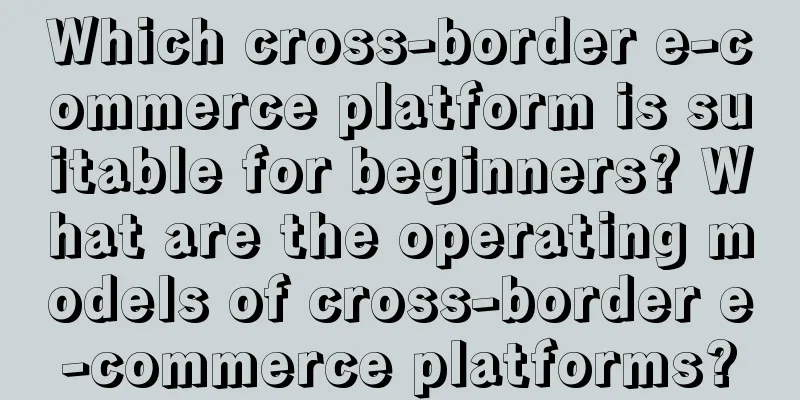Which cross-border e-commerce platform is suitable for beginners? What are the operating models of cross-border e-commerce platforms?

|
Cross-border e-commerce is developing very well now, and more and more merchants are starting to do this industry. If we want to do cross-border e-commerce, we still have to choose a suitable platform. So, as a novice, which cross-border e-commerce platform is suitable for us? Which cross-border e-commerce platform is suitable for beginners? Many novices will choose Amazon or AliExpress first, but in fact Amazon is not very friendly to novices. First of all, Amazon is a cross-border e-commerce platform that attaches great importance to products and brands. It has high requirements for operations and the initial investment costs are also relatively high. In addition, Amazon's platform rules are relatively restrictive. Once there is a violation of the rules, it is very likely that the account will be blocked and the funds will be frozen. AliExpress has relatively high requirements for listings, and its operation difficulty is slightly lower than Amazon. The commission and initial investment costs are also relatively low. Since there are not so many restrictions on the platform rules, AliExpress has a relatively greater advantage in the distribution model. Nowadays, the competition in the European and American markets is very fierce. We might as well turn our attention to the emerging Southeast Asian market. Platforms such as Lazada and Shopee are currently very popular, and their market consumption capacity is also very considerable. What are the operating models of cross-border e-commerce platforms? 1) Amazon has two models: FBA and FBM. First of all, the FBA model sends products to overseas warehouses, which are officially confirmed to be responsible for product delivery and distribution. The speed is fast, and there will be no customer complaints or other unnecessary disputes due to delayed delivery, resulting in bad reviews. However, this model requires a large amount of stockpiling in the early stage, which occupies personal funds, and is risky. Long-term stockpiling will also incur storage costs. If the FBM model is adopted, it is very necessary for novice sellers. Many factors such as self-delivered product inventory and return processing are controllable, and there is no need to stockpile a large amount of goods. The profit margin is larger and it is convenient to directly serve users. The disadvantage is that the chance of winning the Buy Box is lower than that of FBA, Amazon Prime cannot be used, and logistics processing is time-consuming! 2) AliExpress has both online and offline delivery channels. There are two types of logistics models on AliExpress. One is that the seller is responsible for finding international logistics to ship overseas, which is a self-delivery model; the other is a logistics delivery model that cooperates with the platform and the official, first stocking the products in overseas warehouses and then shipping them after receiving orders. These two methods have their own advantages and disadvantages: Shipping through the official platform requires online payment of logistics fees, and you can file complaints and claims online due to logistics problems; offline logistics requires prepayment of fees first, and if logistics problems arise later, the offline freight forwarding company will not bear any responsibility, so the risk is relatively high. 3) The logistics providers used in different Shopee sites are slightly different. The logistics channels of different registered sites are also different. First, there are three types of logistics channels in Taiwan, mainly through YTO, SF Express and Shopee's SLS, home delivery and store delivery services. Secondly, Singapore, Malaysia and Thailand use the following three channels: SLS (Shopee logistics service), LWE and Easy Export (CK1) China Post parcel service; Indonesian sites use SLS and LWE Indonesian logistics channels; Philippines and Vietnam use SLS. There are many Shopee sites, and different countries have different channels, and different countries have different banned and restricted products. What kind of logistics the seller uses and whether it can be used depends on the requirements of the site logistics channel. There are actually many cross-border e-commerce platforms for everyone to choose from. If you want to do a cross-border e-commerce platform, you must make a good choice. It does not mean that the best and largest platform is suitable for everyone. And after opening a cross-border e-commerce, there are still many things to do. Recommended reading: What are the characteristics of wish cross-border e-commerce platform? What are the promotion methods of cross-border e-commerce platforms? Detailed introduction What is the registration process for cross-border e-commerce platforms? Taking Amazon as an example |
<<: Shopee releases update on returns and refunds
Recommend
Luckin Coffee: “Hot search again”
A while ago, a joint venture between Luckin Coffee...
After taking a look at the top ten consumer products in terms of the number of fans on Xiaohongshu, is this brand game worth focusing on?
Taking the top 10 Xiaohongshu consumer brands with...
Overseas short video marketing: How to calculate audience engagement rate?
With the rise of social media and digital marketin...
Data analysis report, so that the audience will not touch their phones
Many newcomers complain that they don't really...
Xiao Yangge disappears, Li Jiaqi says "difficult", top anchors 618 life
This year's 618, the atmosphere of the promoti...
What should data analysts do when they are always faced with various difficulties?
Students who work with data may encounter many dif...
Behind the popularity of Harbin, who can become the “city’s business card”?
Northeast China tourism has become popular this wi...
Coco Tree Coconut Juice has released a calendar that needs to be mosaiced!
This article mainly analyzes the healthy products ...
What should I do if others are also selling the products I sell?
In the market, what should you do if the other par...
How to register a wish store? What should I pay attention to when registering a wish store?
Wish is a popular mobile e-commerce platform that ...
The copywriting that even your mother understands is the good copywriting
Just kidding, a good copywriting is one that even ...
Before launching new products, go to Xiaohongshu first
In this rapidly changing market environment, launc...
What is the main account in Shopee? Detailed answer
When opening a store online, merchants can registe...
Top 10 Most Popular Case Studies of 2022
When planning and producing any social communicati...
All hands on deck? Automakers’ livestreaming opens up an era of “team battles”
Competition among car companies has become fierce....









